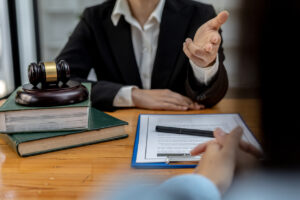
When you’re hurt in an accident caused by someone else in Florida, you might file a personal injury claim against them to recover losses for medical care, lost income, pain and suffering, and other damages. To succeed, you must meet the burden of proof, which is the amount of evidence and certainty you need to convince a judge or jury.
If you don’t meet that burden, you might not receive compensation, no matter how severe your injuries are. Below is an explanation of how the burden of proof works for personal injury lawsuits in Florida, why it’s crucial, and how it changes for punitive damages.
What Is the Burden of Proof?

The burden of proof tells you how “persuasive” your evidence must be to win a case. In Florida personal injury claims, this level is typically called “preponderance of the evidence.” You must show it’s more likely than not—meaning over 50% certain—that the other side caused your injuries.
This standard is much lower than the “beyond a reasonable doubt” requirement in criminal cases. Yet, it still demands convincing proof. If your evidence tips the scale even slightly above 50%, you meet the preponderance requirement and can get damages.
Burden of Proof in Personal Injury Cases
Negligence is the focus of most Florida personal injury claims. You must establish four elements by a preponderance of the evidence. Each element should be backed with strong facts, testimony, and records.
You must show that the at-fault party owed you a duty of care, which typically involves behaving reasonably carefully in that situation. You also need to prove the party breached that duty by acting or failing to act safely, such as driving recklessly or cleaning up a spill. Next, you must connect that breach to your injury and confirm that you actually suffered damages, like medical costs or lost wages, because of it.
Having enough evidence to cover each of these points is key. If you can’t prove even one element to the required level of certainty, the judge or jury must side with the defense. An experienced personal injury attorney can guide you through these steps while you focus on your health and recovery.
Punitive Damages and a Higher Standard
Sometimes, a defendant’s behavior goes far beyond mere carelessness. If they acted with extreme recklessness or malice, Florida law may allow you to seek punitive damages, which aim to punish the wrongdoer rather than just compensate you. Unlike ordinary damages, punitive damages have a stricter burden of proof called “clear and convincing evidence.”
This standard sits between preponderance of the evidence and beyond a reasonable doubt. It means you must offer proof that strongly shows the defendant’s conduct was so reckless or willful that it justifies punishment. Many personal injury claims won’t reach this level, but it’s important to know about it if your case involves especially bad or deliberate behavior.
Why the Burden of Proof Matters
The difference between winning and losing your case is meeting the right burden of proof. You won’t get a favorable verdict if your evidence isn’t strong enough to convince a judge or jury. That’s true even if you’re certain you were wronged. The law wants you to prove enough to justify making the other side pay.
To boost your chances of meeting this threshold, you need thorough evidence. This might include detailed accident reports, police findings, medical records, and credible witness statements. Insurance companies often push back with their own versions of events, so being organized and prepared is vital.
Contact a Florida Personal Injury Lawyer for a Free Consultation
If you’re confused about gathering enough evidence or if the insurance company is pushing back, it may be wise to speak with an experienced attorney at (407) 801-3000. A Florida personal injury lawyer of our legal team at Norden Leacox Accident & Injury Law, can explain how the burden of proof works in your specific case, help collect the evidence you need and guide you through each legal step. If punitive damages might apply, your lawyer can also clarify the higher standard of clear and convincing evidence.
